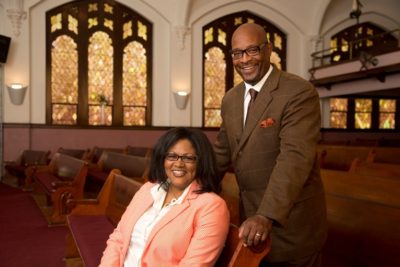Improving the health of African Americans
A theme of healthy living runs throughout Calvary Temple Baptist Church at 29th and Holmes in Kansas City, in its stacks of black health magazines, in HIV prevention posters and most profoundly in the Calvary Community Wellness Center, with rows of treadmills and elliptical machines and a rock-climbing wall.
People ask Calvary’s pastor, the Rev. Eric Williams, why this focus on health — at church? He answers with John 3:2.
“Beloved, I wish above all things that you may prosper and be in health, even as your soul prospers,” Williams said at the KC FAITH (Fostering Action and Improvements To Health) Initiative Community Forum at the Kauffman Foundation. “At church, we tend to focus on the soul part and not the health part.”
“Amen,” said the audience of area health and church leaders. The University of Missouri-Kansas City Community Health Research Group, in the Psychology Department, organized the forum. It is part of an effort, funded by an $850,000 federal grant, to create local strategies to address African American health disparities – whereby African American communities suffer rates of certain diseases much higher than those of the general population.
At the forum, officials announced that Kansas City area faith leaders will focus on diabetes and heart disease/stroke as their primary health priorities, a decision based on community health needs surveys conducted with 11 Kansas City area African American churches.
“I’ve comforted people who have been amputated because of diabetes,” Williams said. “I’ve talked to people on their deathbeds who wish they had exercised more or who wish they hadn’t smoked so much. We half-joke that we have funerals for church members, bury them and then come back to the church and eat the food that killed them. Macaroni and cheese, collard greens with ham and fried chicken.”
Williams, who once thought exercising was a luxury, practices what he preaches now by making much healthier choices. But like faith is a journey, the path to good health, too, can be a winding road. Just this year, he and his wife invested in a high-powered blender capable of pulverizing green leafy vegetables and fruit into breakfast, and dessert when he craves something sweet. He has lost weight.
“Ginger is the key ingredient,” said Williams. “It’s tough because when it comes to eating especially, it comes from generations of our culture.”
African Americans top the charts in nearly every health disparity, said Jannette Berkley-Patton, director of the UMKC Community Health Research Group and assistant professor in the UMKC Department of Psychology. She is the primary investigator of the $850,000 National Institute of Minority Health and Health Disparities grant that’s focusing on addressing African American health disparities in church-community settings. She presented findings from the health-needs assessment surveys at the forum and reported that diabetes and heart disease/stroke were the priority health disparity issues identified by survey respondents. The KC FAITH Initiative will address these issues by developing a pilot church-based health intervention that will include health education, screening and linkage to care strategies. Six local churches will be involved in the pilot study.
Berkley-Patton is also the principal investigator of a National Institute of Mental Health-funded project, Taking It to the Pews, to examine religiously-appropriate HIV testing intervention strategies in African American churches. A key statistic: 13 percent of the U.S. population is African American but 50 percent of those with HIV are black. Now close to 30 churches in the Kansas City region – and 10 in Montgomery, AL — have used Taking It to the Pews toolkit materials/activities which include HIV education and church-based HIV testing strategies that can be infused into their church services through sermon guides, church bulletins, posters, printed and video testimonials and games that can be played in Sunday school.
Calvary Community Outreach Network is co-developer of Taking It to the Pews. Williams’ own health-in-faith walk began when he led funeral services for a man who had AIDS after the pastor of the deceased man’s family refused.
“In recent years, evidence-based research practice and strategies have made a difference with HIV and AIDS,” Williams said. “Now is the time to do those same things with diabetes and heart disease/stroke.”
Dianne Cleaver, executive director of the Urban Neighborhood Initiative, spoke at the forum and said she can see no better partner in health than the church.
“The church is trusted,” said Cleaver, wife of U.S. Congressman and former Kansas City Mayor Emanuel Cleaver. “Fifty-three percent of African Americans attend church on a regular basis. Another 20-something percent attend often. This is a tremendous, tremendous opportunity to make a difference in health.”
Other strategies discussed for improving diabetes through church included pastors modeling receipt of diabetes screenings, sports leagues, partnerships with fitness centers and serving healthy food at church events. For heart disease/stroke, strategies included weight-loss, walking and smoking cessation programs — all at church.
Williams feels that ongoing and future strategies will make a huge impact for him, his congregation and the Kansas City area. In a 2006 Kansas City area health disparities report, African American diabetes patients were four-and-a-half times more likely to have diabetes-preventable hospitalizations than whites.
UMKC Chancellor Leo Morton shared his personal story at the forum that healthier behavior needs to be modeled. Although his parents worked long hours so he too works long hours, they didn’t make fitness a priority so he didn’t either. But when he lost weight a few years ago, his daughter lost more than 100 pounds too.
“The things we do can influence for the better,” Morton said.
To accelerate the successful work of Berkley-Patton and Williams, Morton talked about the Translational Medicine Institute, on the ballots Nov. 5 in Jackson County. Partnering with Children’s Mercy and Saint Luke’s Health System, UMKC would receive $8 million annually for 20 years for research.
“That funding would give the support we need to advance this effort,” he said.
Photo Credit: Janet Rogers, Division of Strategic Marketing and Communications.

